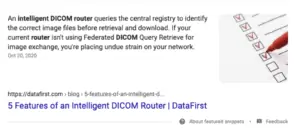Winning the coveted Featured Snippet in the Google organic search results — the Holy Grail for many content marketers and search engine optimizers — takes more than luck, but there isn’t a code to crack or proven way to gain the top-of-the-page exposure.
But what did you expect? It is a Google algorithm, after all.
While there’s no simple 1 + 1 = Featured Snippet formula to follow, there are several things you can do as part of a methodical content creation and search engine optimization strategy that can increase your odds of hitting the jackpot.
A brief history of Featured Snippets
If you’re new to the Featured Snippets game, here’s a quick history lesson:
- 2013: Google began experimenting with Quick Answer boxes — a precursor to Featured Snippets
- Widespread fear that Google was aiming to decrease organic clicks
- 2015: Google expanded the amount of information displayed in these results, now known as Featured Results
- The Featured Result was a redundant listing, meaning the same result appeared below in the #1–10 organic listings
- 2016: Google first referred to these results as Featured Snippets
- 2020: Google de-duplicated the Featured Snippet results, meaning the result did not appear again in the #1–10 organic listings
- Featured Snippets appear in roughly 24% of Google search results
Is this not the most meta thing you’ve ever seen in a search engine result? A Featured Snippet about Featured Snippets.
3 tips for capturing a Featured Snippet
1. Choose keywords for which you rank on page 1 AND Google shows a Featured Snippet.
If your page already ranks on page 1 of the organic results, you will likely have an easier time converting that result into a Featured Snippet. That is if Google deems the searcher would benefit from information displayed in that format.
Strategically choose keywords for which you rank on page 1 but do not yet have the Featured Snippet.
2. Analyze the competition.
Who owns the Featured Snippet? Deep dive into their content to understand why Google might be rewarding it with the top-of-page result. Then, do it better. Structure your content more intelligently, be more relevant to the searcher, provide more detailed information, and be a better resource. Plus, be sure your other SEO intangibles are in order.
3. Be wise about what you say and how you say it.
Start your content by clearly stating the question/problem and succinctly answering it. But don’t stop there. Provide additional details that will let Google know you are an authoritative source, and most importantly, help the searchers who land on your page. Consider organizing your content in bullet lists or tables, as these can be shown in Featured Snippets as well. Google appreciates structure.
Featured Snippet examples: What works?
Content types that typically grab Featured Snippet results include comparisons, lists, how-tos, FAQs, detailed descriptions, and information summarized in tables.
Featured Snippets can work in healthcare technology and life sciences marketing, too! Check out a couple of examples where we helped our clients earn Featured Snippets with thoughtful content and dedicated SEO.
Cellero’s “What’s the Difference Between Monocytes and Macrophages?” blog post answers a very specific and widely searched question in the immunology research community. This post has held the Featured Snippet for many months and has generated tens of thousands of page views.
DataFirst’s “5 Features of an Intelligent DICOM Router” blog post helped them improve their organic rankings for two high-value key phrases from #6 and #3 to the Featured Snippet position for both, outranking competitor websites with much higher Domain Authority scores in the process.
 To win the Featured Snippet, always match the intent of the searcher
To win the Featured Snippet, always match the intent of the searcher
That’s the Golden Rule in SEO, no matter the type of content you’re creating. Keep that at the forefront of your strategy and your efforts will be rewarded.
Questions about improving your online visibility? Ask our experts.



 To win the Featured Snippet, always match the intent of the searcher
To win the Featured Snippet, always match the intent of the searcher
